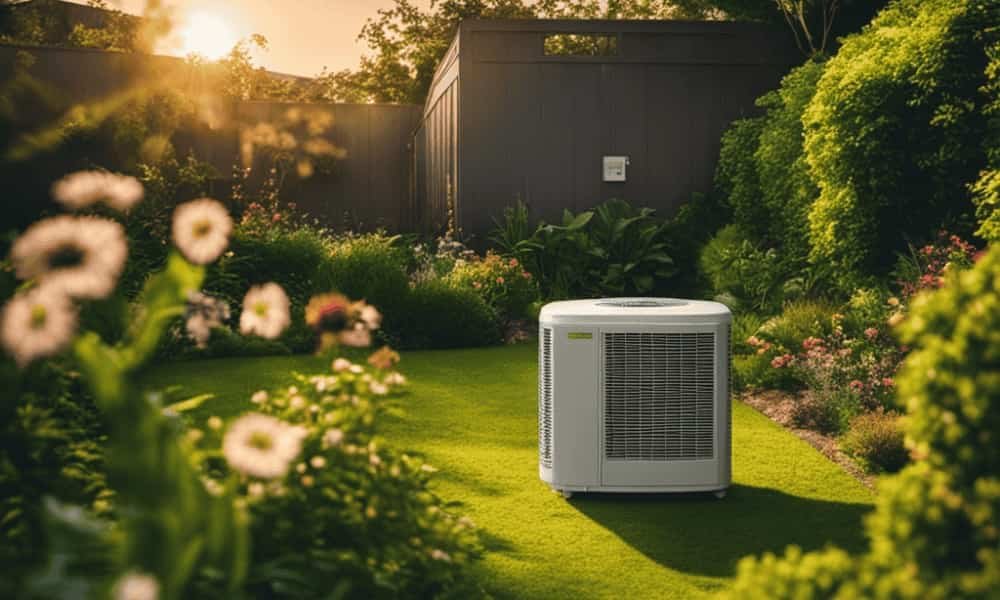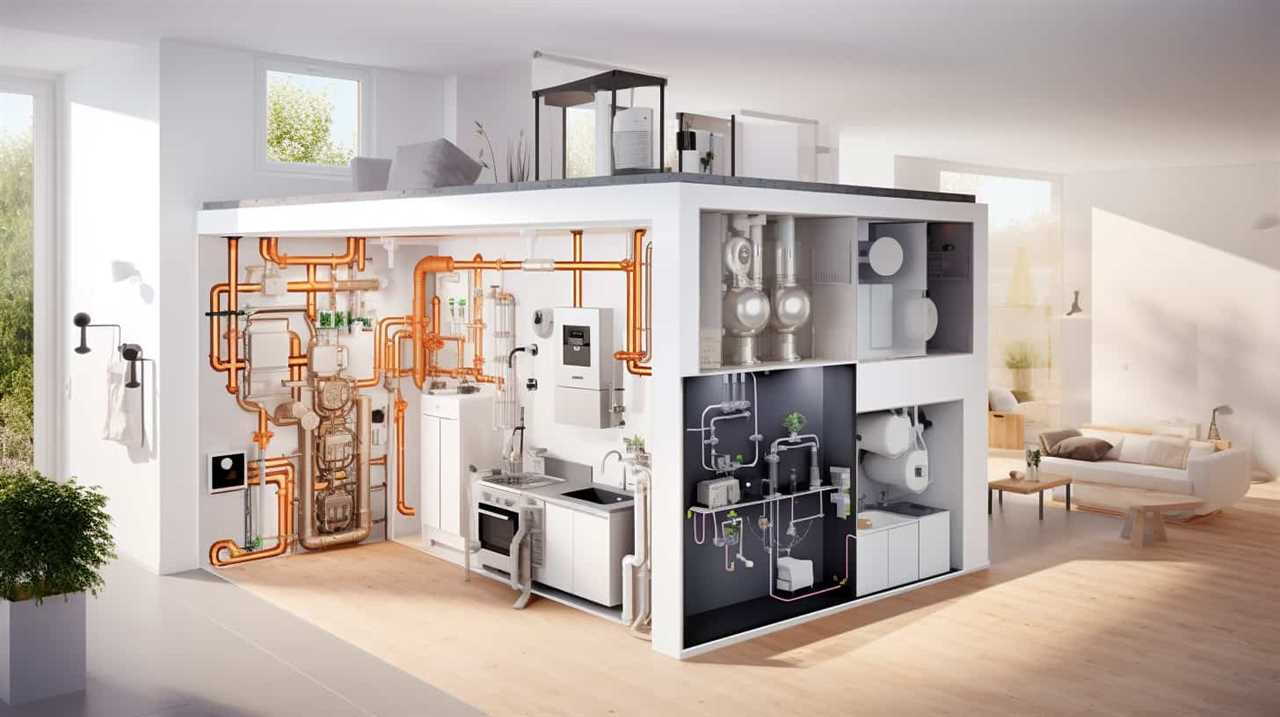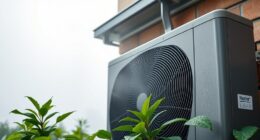- Energy efficiency of heat pumps in extreme climates
- Alternative heating options for regions with unsuitable climates for heat pumps
We have discovered a theory that could revolutionize the way we heat our homes. Heat pumps, often underestimated for their energy-efficient heating abilities, are here to make a big impact.
In this guide, we’ll dive into how heat pumps work, the benefits they offer, and the various types available for your home.
We’ll also help you choose the right size heat pump, provide installation tips, and share maintenance advice for optimal longevity.
Get ready to maximize efficiency and save on heating costs with heat pumps.
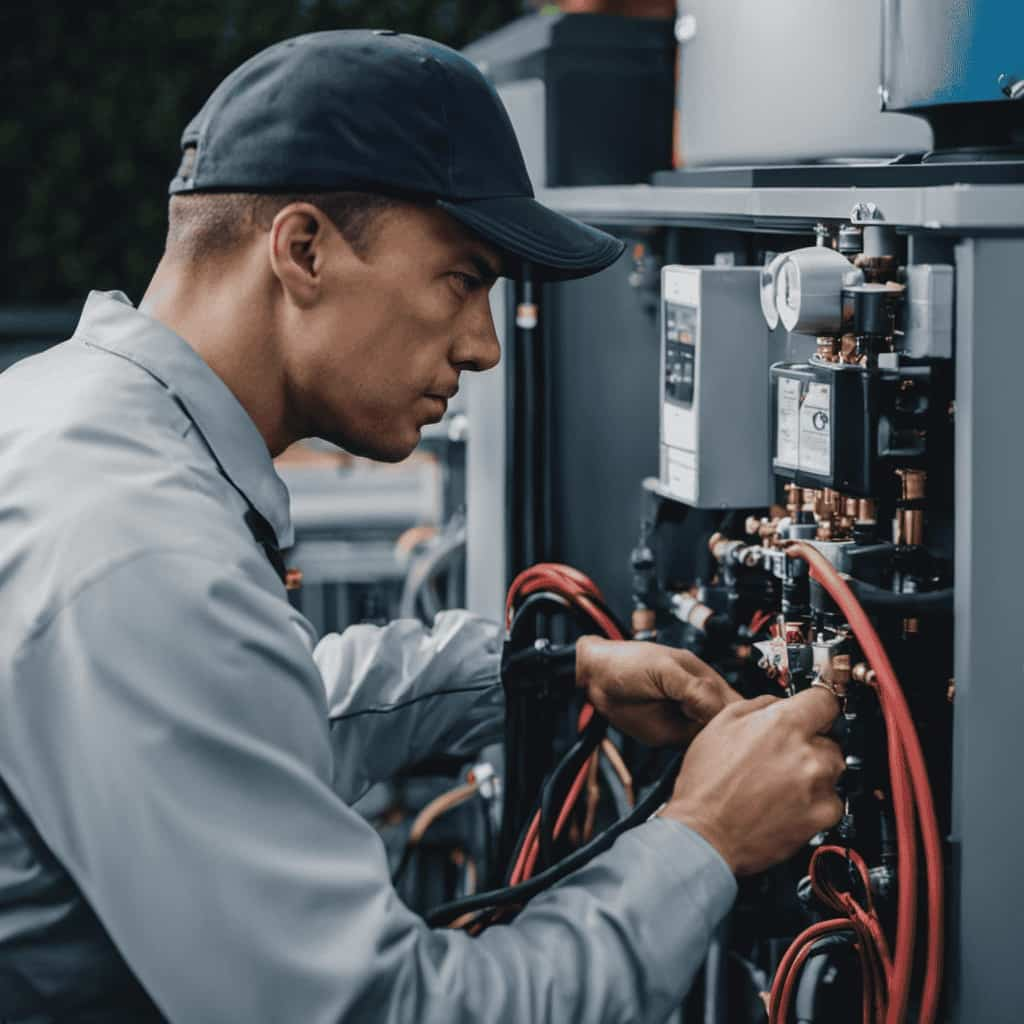
Key Takeaways
- Heat pumps provide both heating and cooling capabilities, making them versatile and efficient for home heating.
- Heat pumps operate at higher efficiencies, resulting in lower energy consumption and long-term savings.
- Heat pumps reduce greenhouse gas emissions and use renewable energy sources, making them environmentally friendly.
- Proper installation, maintenance, and insulation are crucial for maximizing the efficiency and performance of heat pumps.
How Heat Pumps Work
Now, let’s dive into how heat pumps actually work.
Heat pumps operate by transferring heat from one place to another using refrigerant. They work on the principle of extracting heat from a low-temperature source, such as outdoor air or the ground, and then transferring it to a higher-temperature location, like the inside of a building.
This process is accomplished through the use of a compressor, evaporator, condenser, and expansion valve.
One of the advantages of heat pumps is their efficiency. Unlike traditional heating systems that generate heat, heat pumps simply move it, resulting in less energy consumption and lower utility bills.
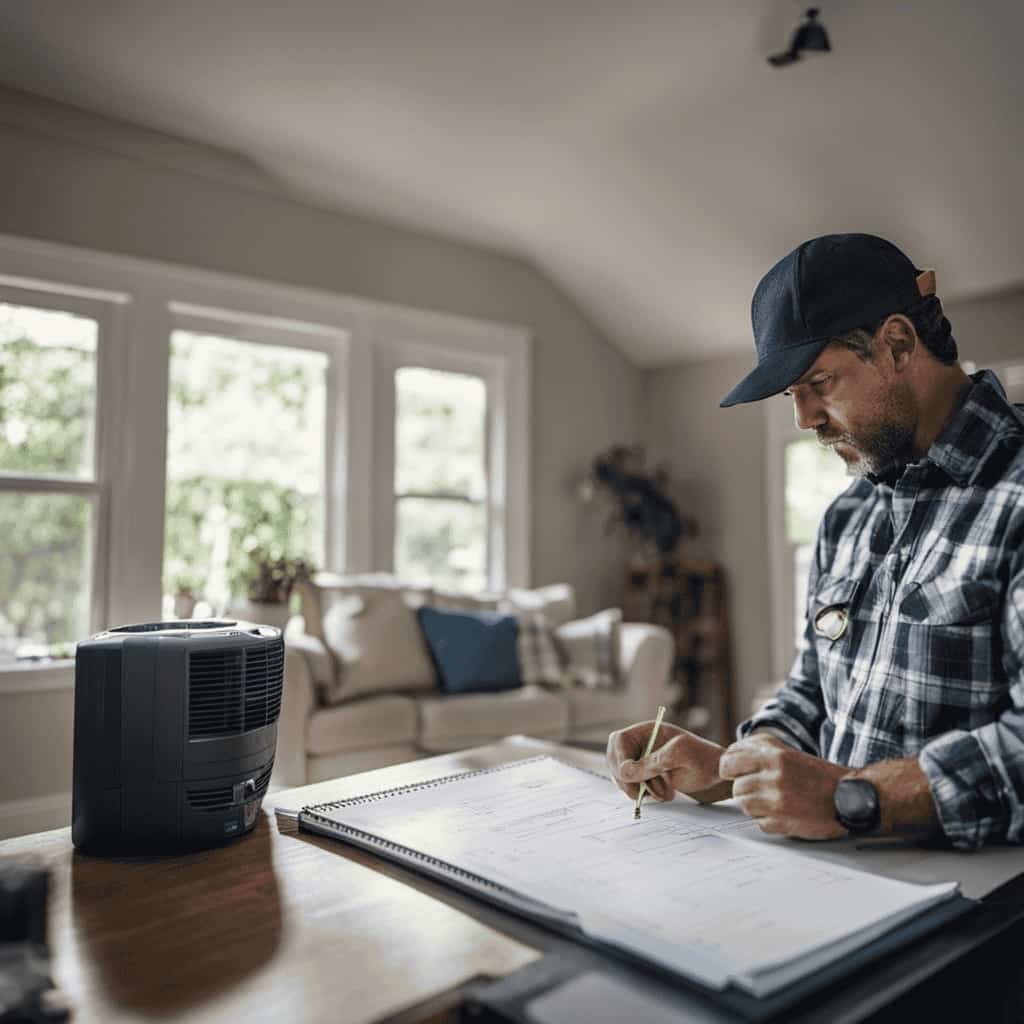
Additionally, heat pumps can also cool a space, providing both heating and cooling capabilities in one system.
The Benefits of Heat Pumps
Heat pumps offer several benefits that make them an attractive option for home heating.
Firstly, they’re a cost-effective solution, as they can provide efficient heating at a lower operational cost compared to traditional heating systems.
Secondly, heat pumps are an eco-friendly choice, as they use renewable energy sources and produce fewer greenhouse gas emissions.
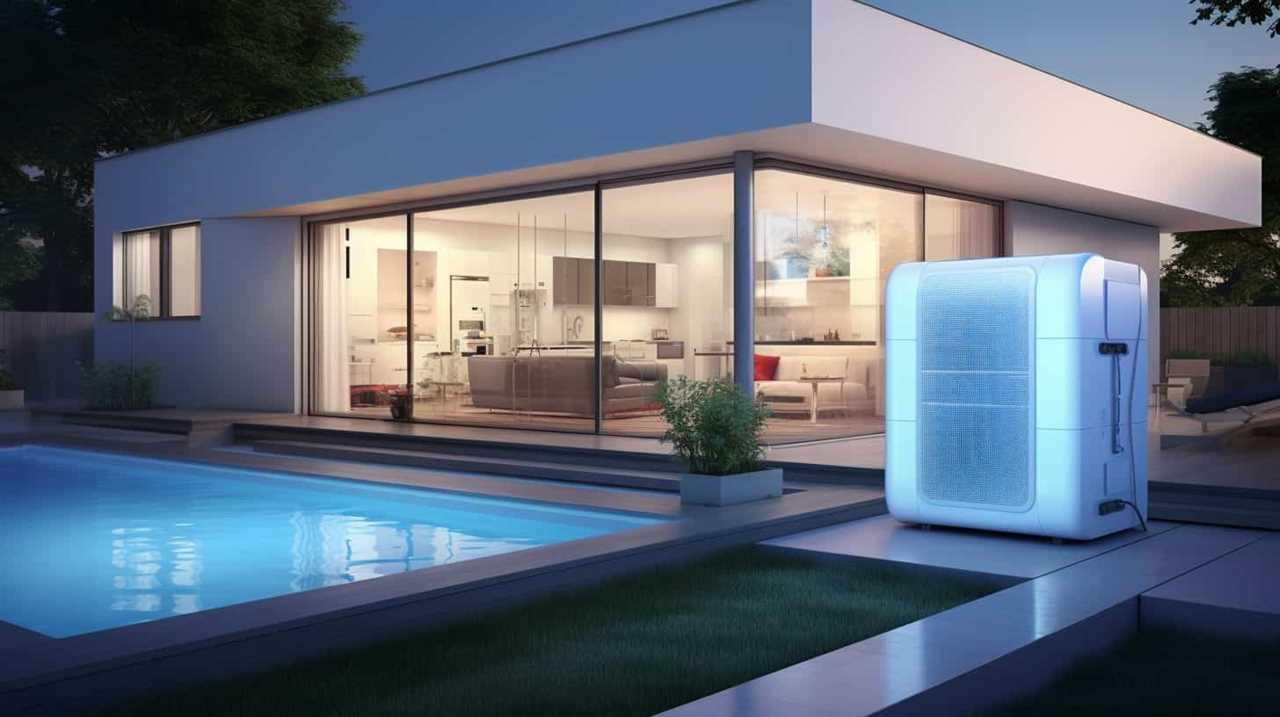
Lastly, heat pumps provide consistent and comfortable warmth throughout the home, ensuring a comfortable living environment.
Cost-Effective Heating Solution
Using a heat pump as a cost-effective heating solution offers numerous benefits for homeowners. Here are some of the key advantages:
-
Cost-saving benefits: Heat pumps are highly efficient, allowing homeowners to save on energy costs compared to traditional heating systems. They can provide up to four times the amount of energy they consume, resulting in significant savings over time.
-
Energy consumption analysis: Heat pumps provide homeowners with the ability to monitor and analyze their energy consumption. This allows for better control and optimization of heating usage, leading to further cost savings and reduced environmental impact.
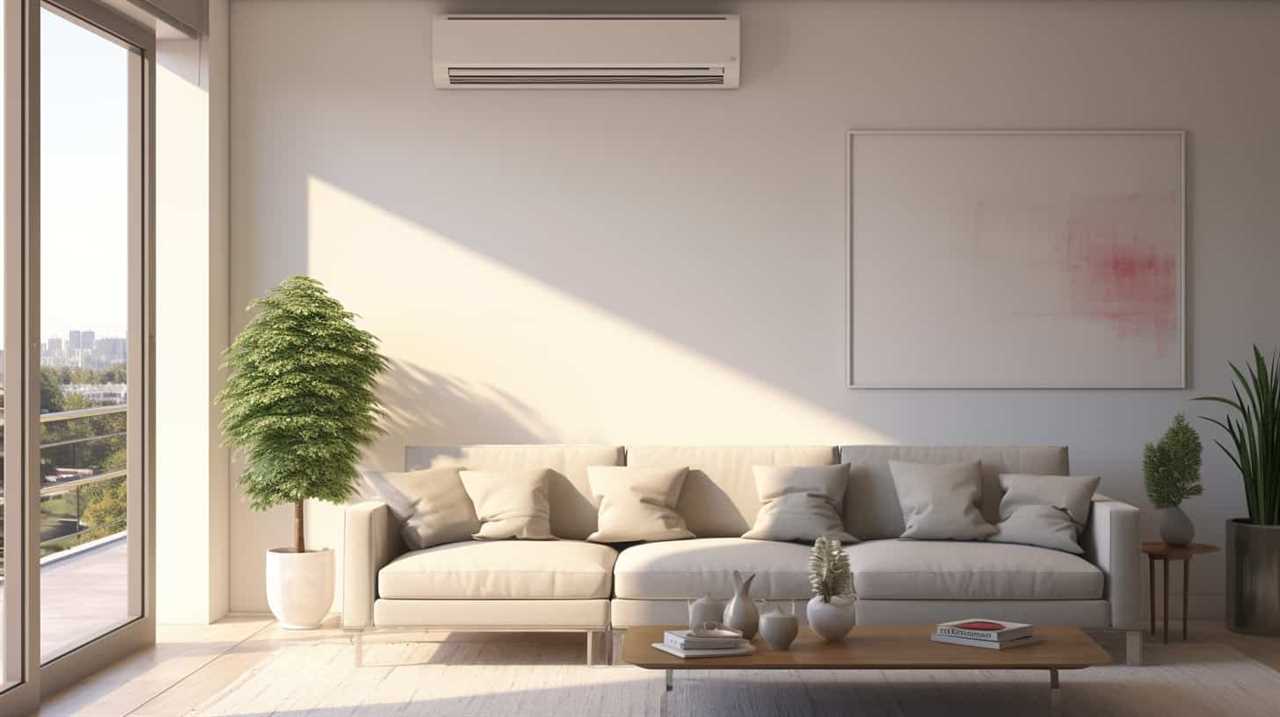
-
Versatility: Heat pumps can both heat and cool homes, making them a versatile solution for year-round comfort. This eliminates the need for separate heating and cooling systems, reducing installation and maintenance costs.
-
Environmental friendliness: Heat pumps operate by transferring heat rather than burning fossil fuels, making them a greener option for heating. By reducing greenhouse gas emissions, homeowners can contribute to a more sustainable future.
Eco-Friendly Heating Option
We also appreciate the eco-friendliness of heat pumps, as they offer numerous benefits for homeowners.
Heat pumps are considered a green heating option due to their low environmental impact. Unlike traditional heating systems that rely on burning fossil fuels, heat pumps transfer heat from the air or ground to provide warmth. This process consumes less energy and produces fewer greenhouse gas emissions, making it an environmentally friendly choice.

By using renewable energy sources, heat pumps help to reduce our carbon footprint and combat climate change. Additionally, heat pumps operate at higher efficiencies, resulting in lower energy consumption and reduced utility bills.
With their eco-friendly features, heat pumps not only provide consistent and comfortable warmth but also contribute to a sustainable and greener future.
Consistent and Comfortable Warmth
For homeowners, one of the key benefits of heat pumps is the consistent and comfortable warmth they provide. Heat pumps are designed to maintain a consistent temperature throughout your home, eliminating the need for frequent adjustments or dealing with cold spots. This ensures that every corner of your living space is cozy and inviting, no matter the weather outside.
With their advanced technology and efficient operation, heat pumps also offer significant energy savings. By extracting heat from the air or ground and transferring it indoors, heat pumps can provide warmth while using less energy compared to traditional heating systems. This not only reduces your carbon footprint but also lowers your utility bills.
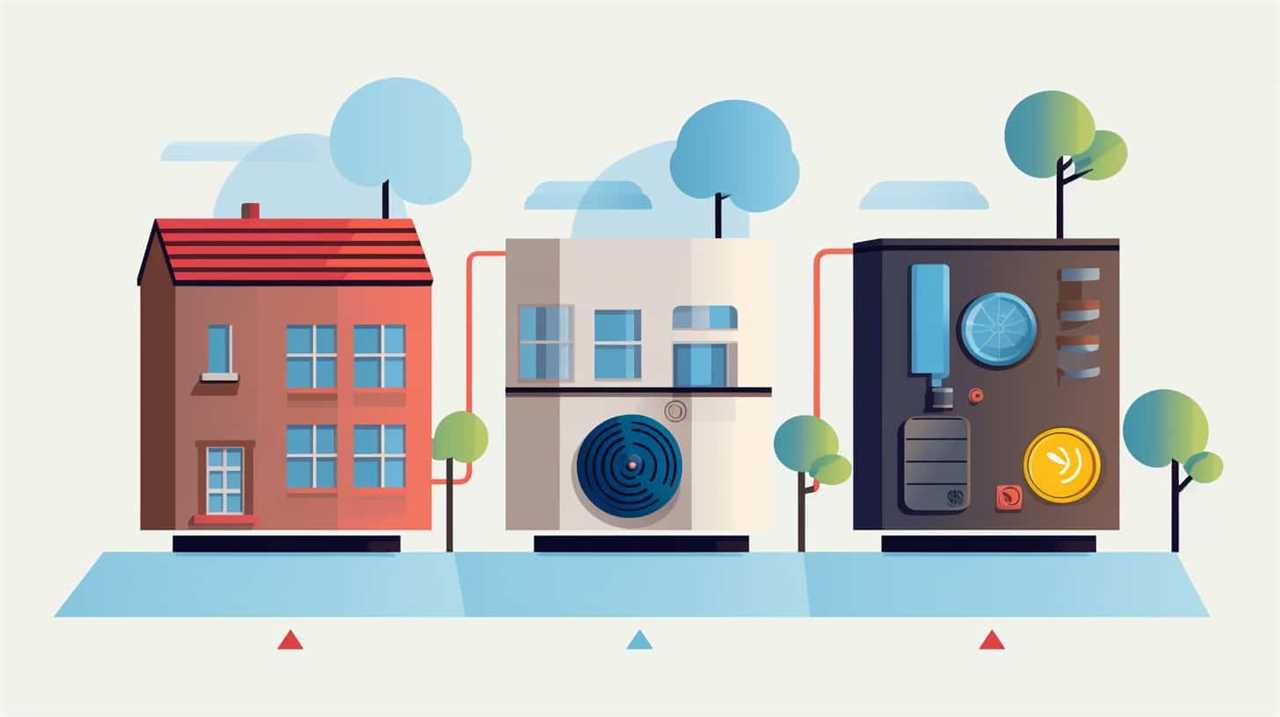
With heat pumps, you can enjoy a comfortable home environment while saving energy and money.
Now, let’s explore the different types of heat pumps for home heating.
Types of Heat Pumps for Home Heating
Let’s now explore the different types of heat pumps available for home heating.
One important consideration is whether to choose an air-source or ground-source heat pump.

We’ll discuss the cost and efficiency of each option, as well as their suitability for different climates.
Air or Ground
Which type of heat pump is more suitable for home heating: air or ground? This is a common question among homeowners looking to improve their energy efficiency. Let’s explore the options and dive into the advantages and disadvantages of each.
-
Air-source heat pumps: These systems extract heat from the outdoor air and transfer it inside. They’re relatively easy to install and require less space compared to ground-source heat pumps.
-
Ground-source heat pumps (geothermal): These utilize the stable temperature of the ground to extract heat. While they require more space and a higher initial investment, they offer higher efficiency and can provide both heating and cooling.
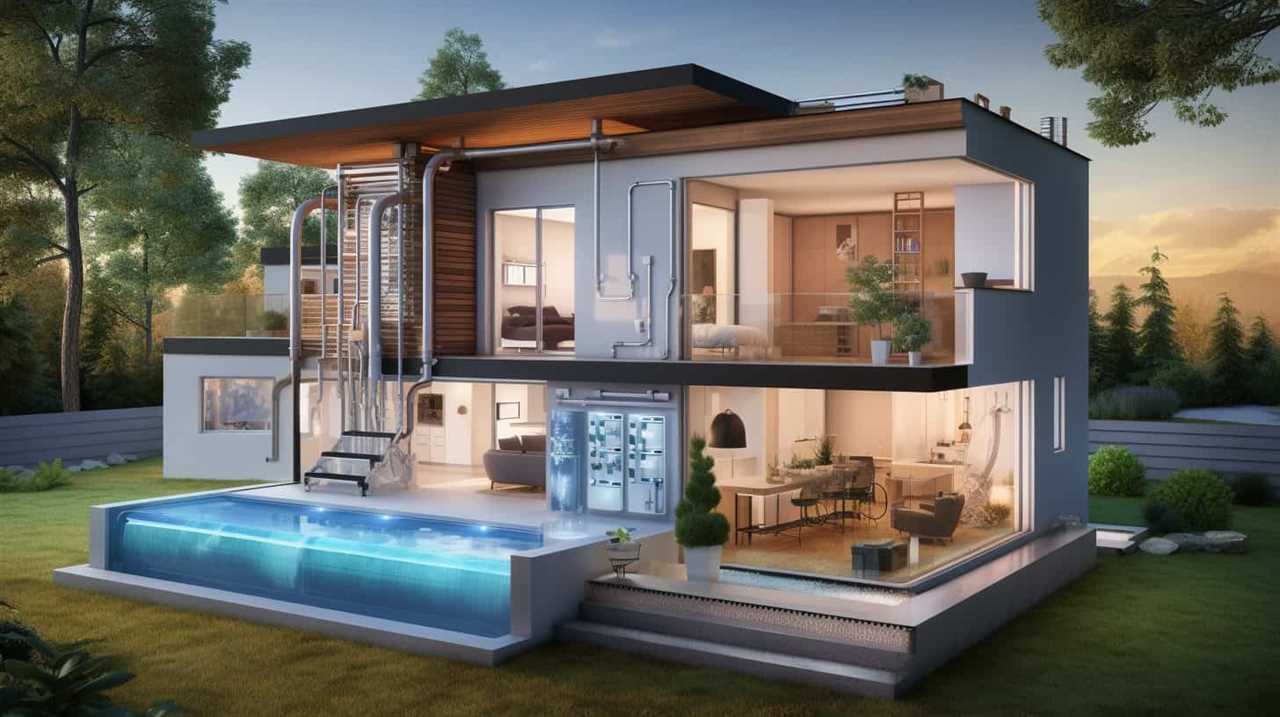
When considering air vs geothermal heat pumps, it’s important to weigh the energy savings potential, installation requirements, and the specific needs of your home.
Transitioning into the next section about cost and efficiency, we’ll explore how these factors impact the overall decision-making process.
Cost and Efficiency
When considering cost and efficiency, we can evaluate different types of heat pumps for home heating. Conducting a cost analysis is crucial to determine the most suitable option for your specific needs.
Heat pumps can vary in terms of initial cost, installation, and long-term energy savings. Air-source heat pumps are generally more affordable upfront and easier to install, but they may have slightly lower energy efficiency compared to ground-source heat pumps.
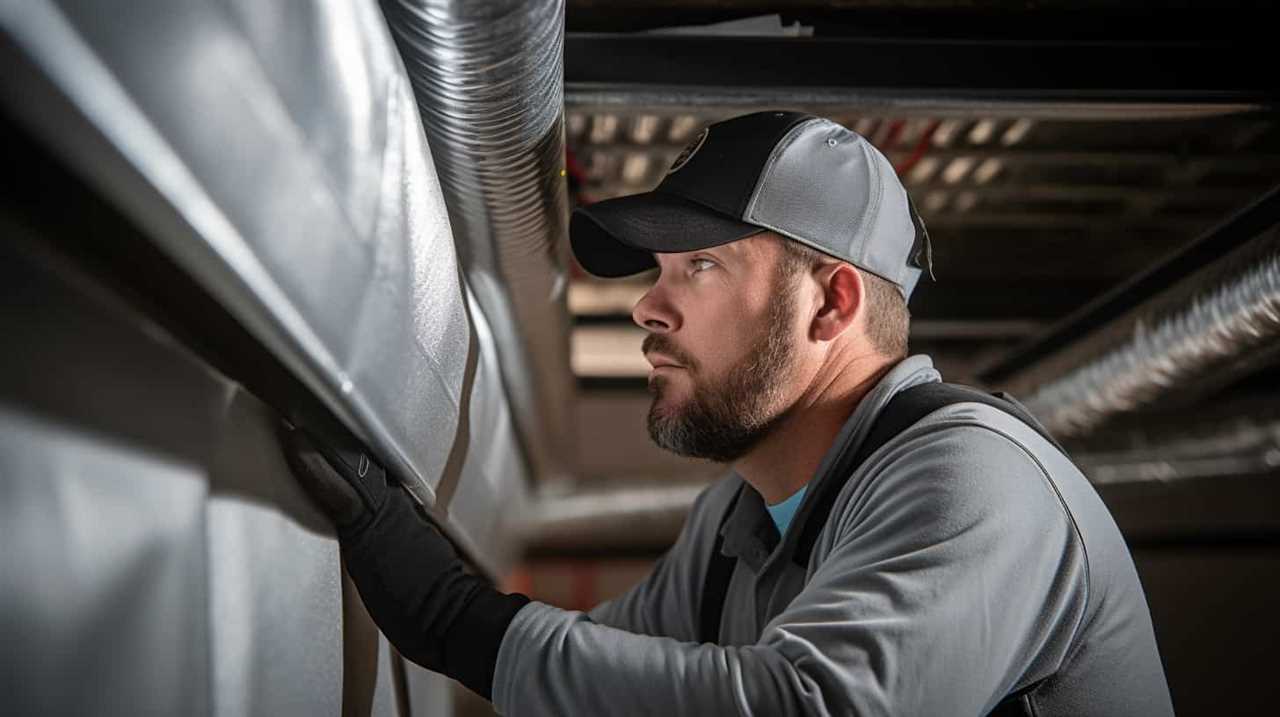
Ground-source heat pumps, also known as geothermal heat pumps, have higher initial costs but offer significant energy savings in the long run. These systems utilize the stable temperature of the ground to provide efficient heating.
Suitable for All Climates?
While there are different types of heat pumps for home heating, it’s important to consider their suitability for all climates. When it comes to energy efficiency in extreme climates, heat pumps can be a great option. However, there are some factors to consider. Here are some discussion ideas:
-
Energy efficiency of heat pumps in extreme climates: Heat pumps are known for their energy efficiency, but their performance can be affected in extreme climates. In areas with extremely cold temperatures, the efficiency of air-source heat pumps may decrease, requiring additional heating sources to supplement their output.
-
Alternative heating options for regions with unsuitable climates for heat pumps: In regions with unsuitable climates for heat pumps, alternative heating options may be more suitable. These options can include furnaces, boilers, or hybrid systems that combine different heating technologies to provide efficient and reliable home heating.

-
Climate-specific considerations: It’s essential to consider the specific climate conditions of your region when choosing a heat pump. Factors such as average temperatures, humidity levels, and heating demands should all be taken into account to ensure optimal performance and energy efficiency.
-
Consulting with HVAC professionals: To determine the best heating solution for your specific climate, it’s recommended to consult with HVAC professionals. They can assess your home’s heating needs and recommend the most suitable heat pump or alternative heating system based on your region’s climate conditions.
Choosing the Right Size Heat Pump for Your Home
We need to consider the appropriate size of the heat pump for our home in order to ensure efficient heating. When it comes to sizing considerations, it’s important to strike the right balance between a heat pump that’s too small and one that’s too large.
An undersized heat pump will struggle to meet the heating demands of our home, resulting in poor performance and increased energy consumption. On the other hand, an oversized heat pump will cycle on and off frequently, leading to inefficient operation and unnecessary wear and tear.

To determine the right size heat pump, we should take into account factors such as the square footage of our home, insulation levels, and climate conditions. By selecting the appropriate size, we can maximize energy efficiency and achieve optimal heating performance.
Now let’s move on to the next section, where we’ll discuss installing a heat pump and what we need to know.
Installing a Heat Pump: What You Need to Know
Now that we’ve selected the appropriate size heat pump for our home, let’s move on to the installation process. Installing a heat pump involves several important steps and considerations.
Here are some key points to keep in mind during the heat pump installation process:

-
Site Assessment: Before installation, it’s crucial to conduct a thorough site assessment to determine the best location for the heat pump. Factors such as available space, proximity to outdoor units, and proper ventilation must be considered.
-
Ductwork Inspection: If you have an existing duct system, it’s essential to inspect it for any leaks, gaps, or damage. Properly sealed and insulated ductwork ensures optimal performance and energy efficiency.
-
Electrical Requirements: Heat pumps require a dedicated electrical circuit with the appropriate voltage and amperage. It’s crucial to ensure that your electrical system can accommodate the heat pump’s power needs.
-
Common Installation Challenges: Some common challenges during installation include limited space for outdoor units, complex ductwork modifications, and compatibility issues with existing heating systems. Hiring a professional HVAC contractor with experience in heat pump installations can help overcome these challenges.

Maximizing Efficiency: Tips for Energy-Efficient Heating
To maximize the efficiency of our heating system, we should regularly clean and replace air filters, as well as schedule annual maintenance checks with a qualified HVAC technician. These simple steps can greatly improve the performance and energy efficiency of our heat pump. Additionally, there are other energy saving techniques we can implement to optimize our heat pump’s performance.
One such technique is to ensure proper insulation in our home. By sealing any air leaks and adding insulation to walls, floors, and attics, we can minimize heat loss and reduce the workload on our heat pump.
Another effective strategy is to use a programmable thermostat. This allows us to set different temperature levels throughout the day, ensuring that our heat pump is not working unnecessarily when we are not at home or during sleeping hours.
Moreover, regular maintenance of the heat pump is crucial. This includes cleaning the outdoor unit, checking refrigerant levels, and inspecting electrical connections. By keeping our heat pump in good condition, we can maximize its efficiency and prolong its lifespan.
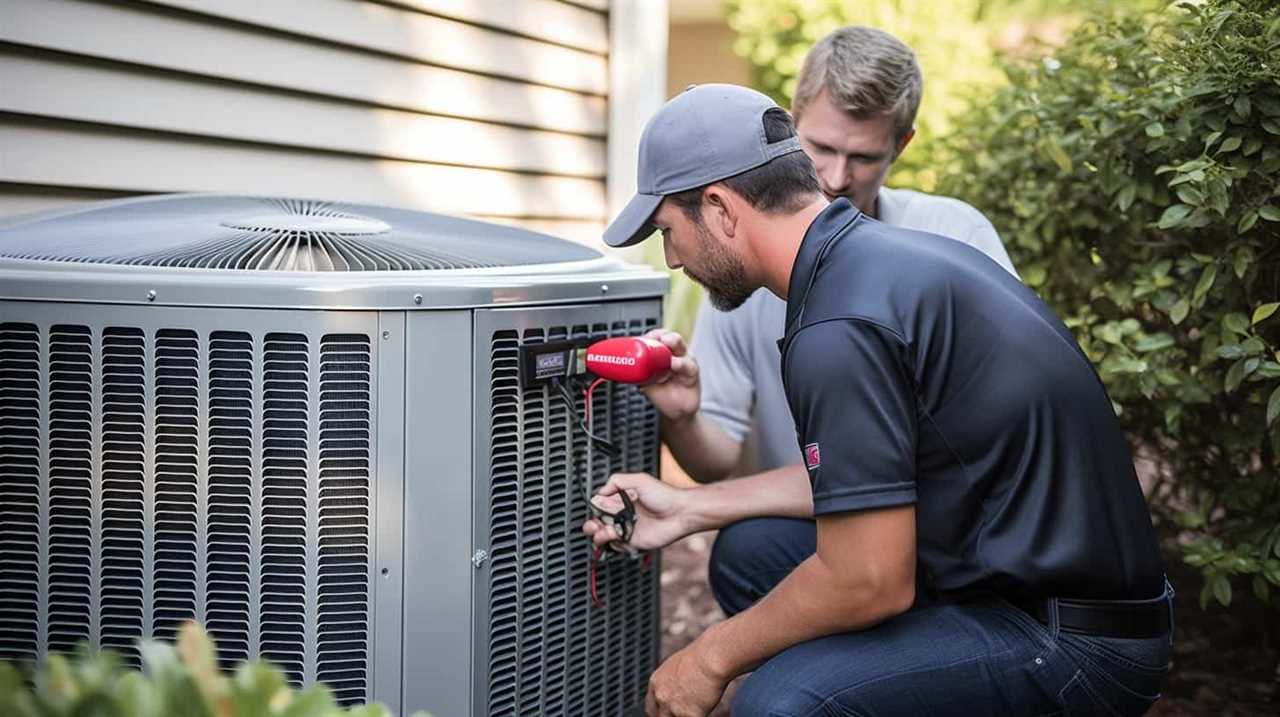
| Energy Saving Techniques | Optimizing Heat Pump Performance |
|---|---|
| Proper insulation | Regular maintenance |
| Use of programmable thermostat | Cleaning the outdoor unit |
| Sealing air leaks | Checking refrigerant levels |
| Adding insulation | Inspecting electrical connections |
Maintaining Your Heat Pump for Longevity
Regular maintenance is essential for maximizing the longevity of our heat pump. By following these heat pump maintenance tips, we can increase the lifespan of our system and ensure optimal performance:
-
Schedule annual professional maintenance: Regular inspections and tune-ups by a qualified technician can identify and address any potential issues before they become major problems.
-
Clean or replace air filters: Dirty air filters can restrict airflow and reduce the efficiency of our heat pump. Cleaning or replacing them regularly can improve performance and prevent unnecessary strain on the system.
-
Keep outdoor unit clear: Clear any debris, leaves, or vegetation around the outdoor unit to ensure proper airflow and prevent damage.

-
Check and clean coils: Regularly inspect and clean the evaporator and condenser coils to remove dirt and debris, as this can affect heat transfer efficiency.
By maintaining our heat pump, we can extend its lifespan and enjoy efficient heating for years to come.
Now, let’s explore how heat pumps compare to other heating systems.
Comparing Heat Pumps to Other Heating Systems
We’ve explored the importance of maintaining our heat pump, now let’s compare it to other heating systems.

When it comes to heating our homes, two common options are heat pumps and furnaces. Heat pumps work by transferring heat from the outside air or ground into our homes, while furnaces generate heat by burning fuel.
One of the key advantages of heat pumps is their energy efficiency. Compared to furnaces, heat pumps can provide significant energy savings, as they use electricity to move heat rather than generating it. This can result in lower utility bills and a reduced environmental impact.
In the next section, we’ll delve into cost considerations and savings with heat pumps, exploring how their efficiency translates into financial benefits.
Cost Considerations and Savings With Heat Pumps
How can we determine the cost considerations and potential savings associated with heat pumps?

When it comes to heat pumps, there are several factors to consider in terms of cost savings and return on investment. Here are some key points to keep in mind:
-
Energy Efficiency: Heat pumps are known for their high energy efficiency, which can result in significant cost savings on your monthly energy bills.
-
Installation Costs: While the initial installation cost of a heat pump may be higher compared to other heating systems, the long-term savings can outweigh this upfront expense.
-
Maintenance and Repair: Heat pumps generally require regular maintenance to ensure optimal performance. However, the cost of maintenance is typically lower compared to traditional heating systems.
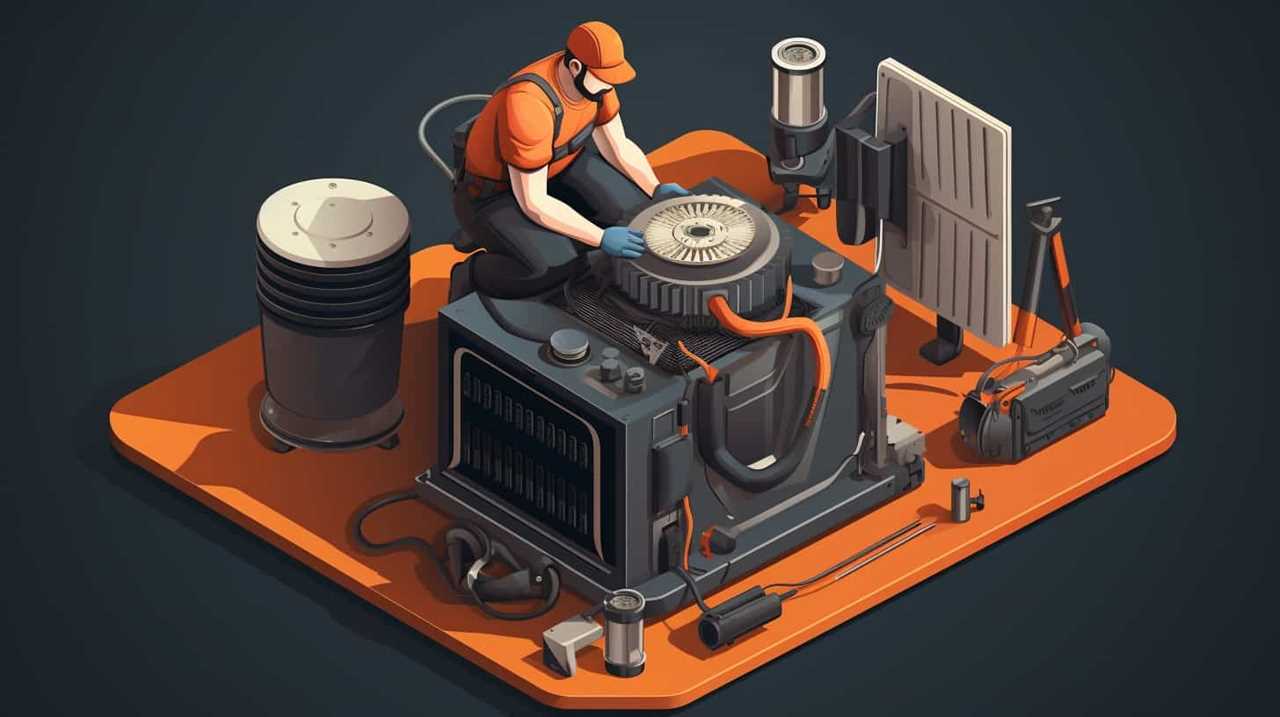
-
Government Incentives: Depending on your location, you may be eligible for government incentives or rebates that can offset the cost of purchasing and installing a heat pump.
Considering these factors can help you make an informed decision about whether a heat pump is the right choice for your home, taking into account both the cost savings and return on investment.
Frequently Asked Questions
Are Heat Pumps Suitable for Both Heating and Cooling?
Yes, heat pumps are suitable for both heating and cooling. They offer several benefits over traditional HVAC systems, such as energy efficiency and cost savings. Heat pump technology is a versatile and efficient option for home heating and cooling.
Can I Use a Heat Pump in Extremely Cold Climates?
Yes, you can use a heat pump in extremely cold climates. While their performance may be affected in sub-zero temperatures, heat pumps are designed to maintain efficiency and provide heating even in extreme cold weather conditions.
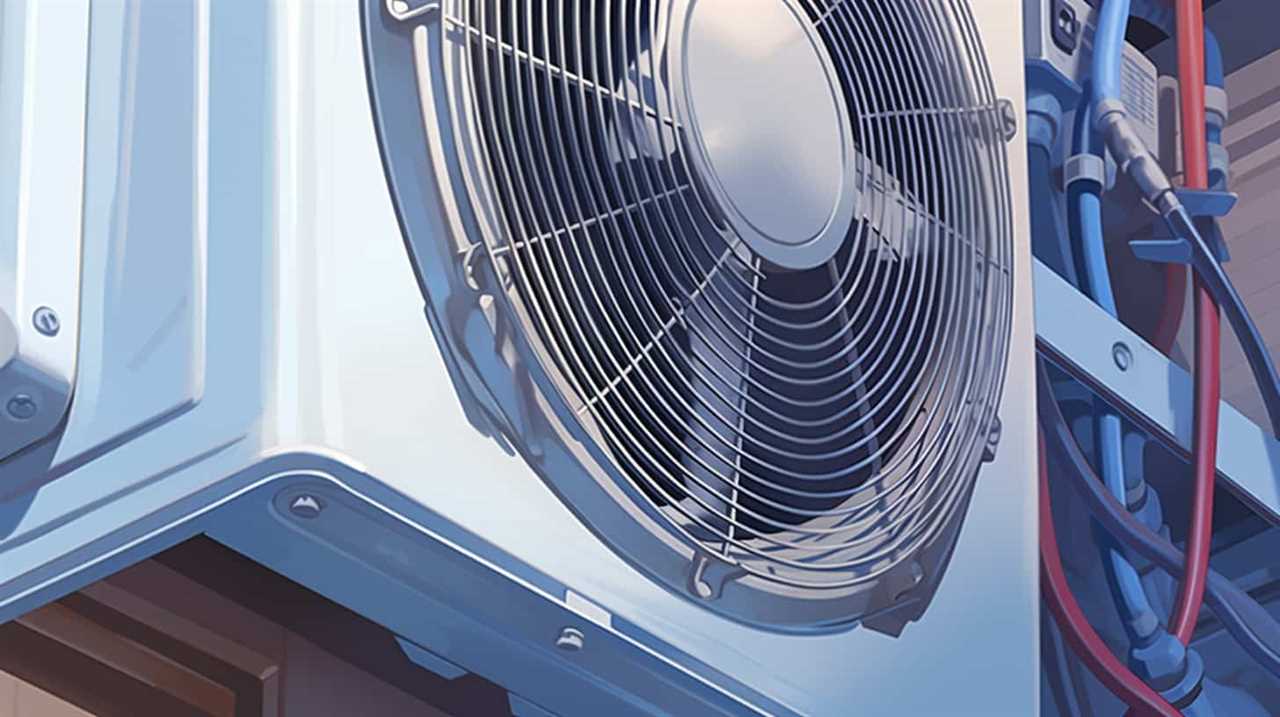
What Is the Average Lifespan of a Heat Pump?
The average lifespan of a heat pump depends on various factors, such as maintenance requirements and usage. Regular maintenance can help prolong its lifespan, ensuring efficient heating for years to come.
Do Heat Pumps Require Regular Maintenance?
Yes, heat pumps do require regular maintenance. It is important to keep them clean, check filters, and schedule professional inspections. Regular maintenance ensures optimal performance and extends the lifespan of the heat pump.
Are Heat Pumps Eligible for Any Government Incentives or Rebates?
Yes, heat pumps are eligible for government incentives and rebates. For example, homeowners can receive a tax credit of up to $1,500 for installing an energy-efficient heat pump, reducing the overall cost of the system.
Conclusion
In conclusion, heat pumps are a highly efficient and cost-effective option for home heating. With their ability to extract heat from the air or ground, they provide reliable warmth while consuming less energy.

By choosing the right size heat pump, properly installing and maintaining it, and implementing energy-saving tips, homeowners can maximize efficiency and save on heating costs.
So, why settle for traditional heating systems when you can embrace the innovative and environmentally-friendly technology of heat pumps? It’s time to heat your home smartly and sustainably.



